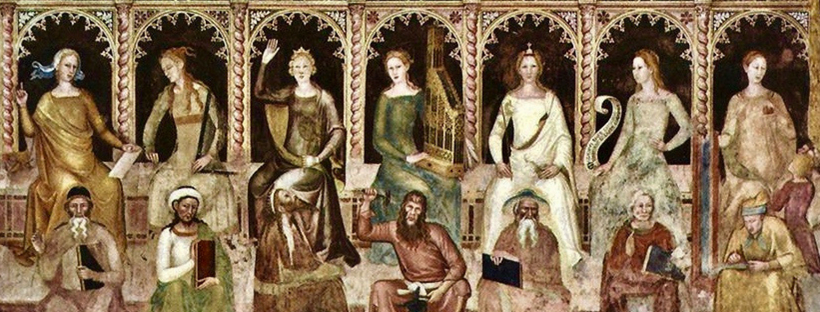Symposium
The Liberal Arts in the 21st Century

Image: Andrea di Bonaiuto, 'Triumph of St Thomas and Allegory of the Sciences' (c.1365-1368, Florence)
There is a familiar rhetoric that suggests that the traditional humanities disciplines are in crisis. While much of this discourse is significantly overblown, it is worth considering the diverse and often conflicting narratives about the putative demise of the humanities and liberal arts in the contemporary university, and what a robust response to them might look like.
On one level are accounts of an internal decline, according to which damage to the reputation of the liberal arts has been largely self-inflicted. Humanities scholars are charged with having succumbed to postmodernism and relativism, abandoning their true calling to embrace divisive identity politics, gender studies, cultural studies, and vaguely specified leftist agendas. The obverse of this critique is the view, advocated by some humanities scholars themselves, that the traditional liberal arts are elitist, Eurocentric, and insufficiently inclusive of diverse cultural viewpoints.
At another level, the humanities are seen to be under threat from what might be called, somewhat imprecisely, the ‘neo-liberal university’. Again, there are conflicting versions of this story. On the one hand, universities have been criticised as ivory towers, out of touch with harsh economic realities, and largely unaccountable to both the tax payers who fund them and prospective employers. On the other hand, universities are said to have become increasingly managerial, with both teaching and research subjected to quantitative measures that are poorly aligned with what are thought to be the traditional ends of education. While the imposition of utilitarian measures of teaching and research outcomes has affected the university as a whole, it has been disproportionally felt in those areas of the Humanities where, it is argued, the ends of teaching and scholarship are not easily captured by crude metrics. There is an oft-repeated view that it the STEM is where the real action is, and that the liberal arts are something of extraneous luxury.
This symposium will explore these competing narratives and consider whether it might be possible, in the present context, to articulate a new, or at least revised, story about the value of a liberal arts education in 21st-century Australia. It will also consider traditional and new models for the teaching of the liberal arts, their relevance to contemporary society, and the practicalities of teaching, research and public engagement.
Themes include:
- What are the ends of university education and of the liberal arts in particular?
- What role do the liberal arts play in the university as a whole?
- 21st-century approaches to the Liberal Arts curriculum
- The ‘canon’
- Teaching/Scholarship/Research nexus
- Getting the metrics right
- Philanthropic support for the Liberal Arts
- Liberal Arts and Public Engagement
For more information contact Trish Ross: t.ross@uq.edu.au
